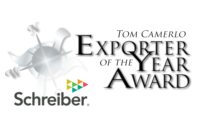This year’s winner helped lay the groundwork for U.S. dairy’s global market.


U.S. commercial cheese exports have been rising steadily for more than a decade, but sales really began to take off in the second half of 2007. Exports were just shy of 100,000 metric tons last year, and from January through August 2008 they were up 49%, on track to reach nearly 150,000 metric tons by year’s end.
A number of companies have contributed to U.S. cheese export success. But few have demonstrated the long-term commitment or consistently strong performances of this year’s Exporter of the Year: Green Bay, Wis.-based Schreiber Foods Inc. “Schreiber is one of the first U.S. dairy companies to recognize the growth opportunities afforded by going international,” says Marc Beck, senior vice president, export marketing, U.S. Dairy Export Council (USDEC).
USDEC and Dairy Foods magazine sponsor the annual Exporter of the Year Award, which is granted to a company that demonstrates leadership in driving global dairy demand and advancing U.S. dairy exports, commits resources to export market development, posts significant export sales, and makes exports a key part of its overall growth strategy.
“Schreiber had the foresight to see that, notwithstanding the huge growth potential of the U.S. market, exports held the promise to become not only a significant part of its own business but a key component of the U.S. dairy industry as a whole,” Beck says.
Indeed, U.S. companies are on track to ship a record 11% of the total milk solids produced in the United States to overseas buyers this year. Compare that to 4 to 5.5% routinely shipped from 1993 to 2003.
About 3.2% of U.S. cheese tonnage moved beyond U.S. borders in the first eight months-an all-time high, up from 1 to 2% from 1999 to 2006. This change has made a significant difference in the supply-demand situation of the U.S. cheese market, where even small shifts can swing the balance.
Schreiber has been a big part of that success. The company made its first export sale, a shipment of cheddar to Algeria, in 1991. Seventeen years later, it sells natural and processed cheese, cream cheese and cheese analogs to 34 countries worldwide. Exports have brought new sales, increased profits, and accelerated company growth. Best of all, it provided a diversified income stream, helping insulate the company from market downturns at home and abroad.
“When the U.S. dairy market was weak, international was strong, and vice versa,” says Deborah Van Dyk, Schreiber’s vice president, industry and regulatory affairs.
Schreiber’s was a long journey from modest beginnings. “In the early years, Schreiber was not sure that exports would flourish as they have,” says Bret Drake, the company’s export team leader. “At that time, Schreiber leaders had a strategic vision to grow internationally. We pursued that strategy by starting with a small staff and attending food shows to learn the business.”
Schreiber was one of four companies that participated in the very first U.S. dairy trade mission sponsored by the National Dairy Board in 1991, when export conditions were significantly less favorable.

The United States at the time was operating at a severe competitive disadvantage versus Europe, Australia and New Zealand. The three dominated the cheese market, controlling more than 85% of global export volume. European suppliers in particular, backed by export subsidies, had a long-established reputation for supplying quality cheese and servicing customers.
On the other hand, the United States was largely starting from scratch, which was one of the tallest hurdles Schreiber says it had to overcome. “Believe it or not, one of the biggest challenges we faced was getting export customers to understand there is a thriving dairy industry in the United States. Even though the United States is the [global] leader in milk production, potential export customers thought that cheese came from Europe and Oceania,” Van Dyk says. “They are becoming increasingly aware that the United States does offer high-quality products at competitive prices.”
Schreiber attributes part of the credit for strengthening the reputation of U.S. cheeses and cheesemakers to USDEC, whose outreach programs, she says, “have consistently put the U.S. dairy industry in front of potential export customers. Their activities such as foreign trade shows, reverse trade missions and in-country studies have opened the door for further sales opportunities with customers that have historically turned to Oceania or the European Union.”
But even as potential overseas customers gained exposure to the U.S. dairy industry, it was up to Schreiber’s talented and dedicated export team to deliver the quality product and demonstrate their commitment to international business. “By all accounts, Schreiber brings a value to the business as a supplier by providing good service and by paying close attention to customer needs,” Beck says. “They add a value proposition that buyers appreciate.”
One example: When potential Southeast Asian buyers expressed interest in U.S. cheese but demanded that it be halal certified (permissible for Muslim consumption), Schreiber researched and found accredited halal certification organizations that were recognized worldwide and then modified its purchasing requirements to comply with its customer’s needs.

“We have gained experience over time working with diverse cultures and providing products that are desired by consumers in diverse cultures,” Van Dyk says.
But that’s just part of the way the company services its customers. Too often, overseas buyers complain about U.S. supplier communication, or lack thereof. They say U.S. companies fail to reply promptly to inquiries, are not committed to the export market, and cannot meet, or do not care to meet, required product or packaging specifications. And they dislike the lack of face-to-face communications and absence of overseas offices for many U.S. suppliers. Not Schreiber.
“Early on, Schreiber had the foresight to recognize the importance of having an in-country presence,” Beck says.
Outside the United States, the company operates plants in Brazil, Germany and Mexico. Schreiber also has joint ventures in four other nations. While those operations may not necessarily utilize U.S. product, they speak to Schreiber’s ability to serve customers and manage its business.
“It’s a sign that they are not building business for the moment-to capitalize on favorable but transitory market conditions-but for the long term,” Beck says.
And long term is a good thing, considering that the global dairy industry-the whole global food industry for that matter-is facing a challenging year ahead. Trade experts expect the global financial crisis to take a bite out of consumer buying power, which in turn will negatively impact consumption. The crisis comes on top of already elevated price levels from last year’s run-up in commodity prices that had dampened demand.
In addition, milk output in Australia, New Zealand and South America is building-a change from recent years when poor weather often caused production declines. That means stiffer competition on the horizon.
But Schreiber is used to competition and in it for the long haul. The company sees good things for dairy, particularly cheese.
Throughout Asia, Latin America and the Middle East, U.S. foodservice chains, and their cheese-laden menus have flourished. Many have become integral to consumers who might never have tasted a cheeseburger 10 years ago.
“In general, world income is rising, and historically people who might not have been able to afford cheese can now purchase it,” Van Dyk says. “The spread of the fast-food industry around the world has also increased not only consumption but also awareness of cheeses used for sandwiches.”
And those consumers are eating a lot of Schreiber cheese.
Schreiber Foods will be presented with its Exporter of the Year Award on Nov. 18 during “USDEC’s Global Dairy Outlook: 2009,” a webinar hosted by Dairy Foods. Visit www.dairyfoods.com to register for this free event.
Schreiber follows the 2007 winner, Darigold Inc., and the first recipient of the honor, Davisco Foods International Inc., in 2006.

